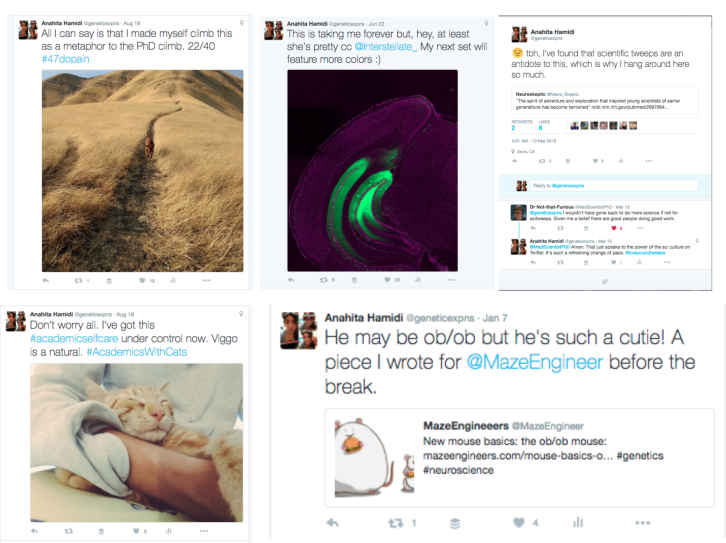[originally posted on Authorea] *for the Reddit/Authorea/Winnower Contest
Tied for 1/2nd place w/ “What Lady Gaga didn’t have for lunch” !

I started a Twitter account in 2010, during my first year of graduate school, because I was told I needed to. Not by my graduate program, but by the Society for Neuroscience (SfN). I had just been accepted to be an official “neuro-blogger” for the SfN conference – an annual gathering that draws over 30,000 attendees. The requirements for outreach were minimal: at least one blog post per day during the conference, preferably within our assigned “theme”. Additional postings were encouraged and Twitter accounts were mandatory.
Here’s the thing: I had zero idea how to use Twitter. Wasn’t it something just like a Facebook status, except with a character limit? Half-way through the conference, I realized everyone was including what looked like keywords in their tweets – and always after that pound symbol (yes, ladies and gents: it was the hashtag). Clueless. Or should I say: #Clueless. I spent most of my efforts that year crafting and posting thoughtful blog posts at the end of each day, occasionally sharing them on Twitter.
When the conference was over, the reality of graduate school hit especially hard. I had worked a full-time job before re-starting student life, and I was used to doing what I wanted with my time – but the #phdlife dictates otherwise. My new life consisted of: class, lab, class, lab, exams, lab papers, lab, seminars, lab – with occasional socialization. I largely stopped blogging because I felt guilty for “wasting time”.
I’ll skip over the details between year 3 and the present (year whatever), because (1) word limits and (2) the details differ, but the story is the same: graduate school can be a harrowing, soul-crushing, and potentially isolating experience. I mean every word of that sentence. Before you know it, you begin planning experiments with an attitude that things are bound to fail. Funding and TAships are limited and, besides, some researcher with more funding and resources is bound to “scoop” you at any moment.
Last year, I wanted to attend SfN again, and I wanted to talk science. So I put together some findings from a study in our lab that was largely “non-scoopable”. I also blogged – and tweeted. The poster presentation went well and, this time, I began tweeting like I’d fallen out of the womb knowing how. In the end, though, it wasn’t the lingo and the pace with which I was able to keep up with #sfn15 on Twitter that was impressive. Instead, I was awed and surprised by the positive attitude of the community of “tweeps” I began to follow and interact with.
In fact, I would go so far as to say that the scientists who have taken to Twitter are part of a counter-culture to an otherwise cut-throat, stifling, fiercely competitive, exhausted community of scientific researchers. I know that the graduate school experience is a drop in the bucket of tears and sweat that it takes to make it as a senior scientist these days. Arguably, that’s exactly why it’s all the more important to embrace a spirit of collaboration, outreach, openness and self-care. I thought I was an outlier for believing as much, but it seems the tweeps are with me on this.
Lest anyone think that the only thing I love about Twitter are the tweeps themselves (and this would be enough to keep me signed on), it’s important that I name just a few of the concrete ways in which social media has positively impacted me as a researcher:
Resources shared under the hashtag #OpenScience, have allowed me the opportunity to see examples of successful grant applications, job applications, and statements.
Doors Open. Because I blogged and shared on Twitter, my writing was visible and I was offered the unique opportunity to write for the NTNU/Kavli Foundation in Norway, interview Nobel-prize winning scientists about their science, and learn about their vision for neuroscience.
Outreach: In addition to my freelance writing, I was a host for a ro-cur Twitter account (NeuroTweeps) to disseminate science to the public. I also contributed my science to a unique and beautiful magazine (Interstellate).
Physical and Mental Health: I participated in #47dopain – an exercise challenge (40 workouts within 47 days) with individuals across the globe and continue to use the #AcademicSelfCare hashtag to take “days off” to unplug, and refresh.
During the course of the past year, I have rediscovered my optimism, my confidence, my curiosity – and my love for science. While it might seem that my plate is full now more than ever, I have actually been re-energized and even more productive in lab. There’s something about feeling like we’re all in this beautiful mess together that gives, rather than takes away #AllTheEnergy and #AllTheHope.

